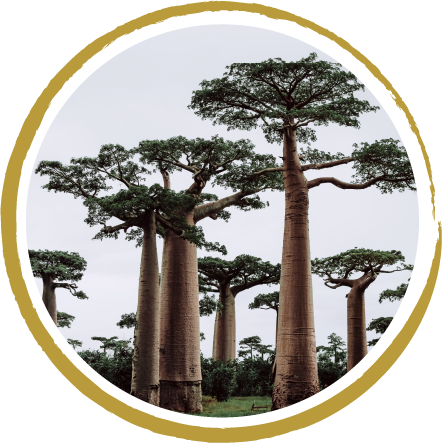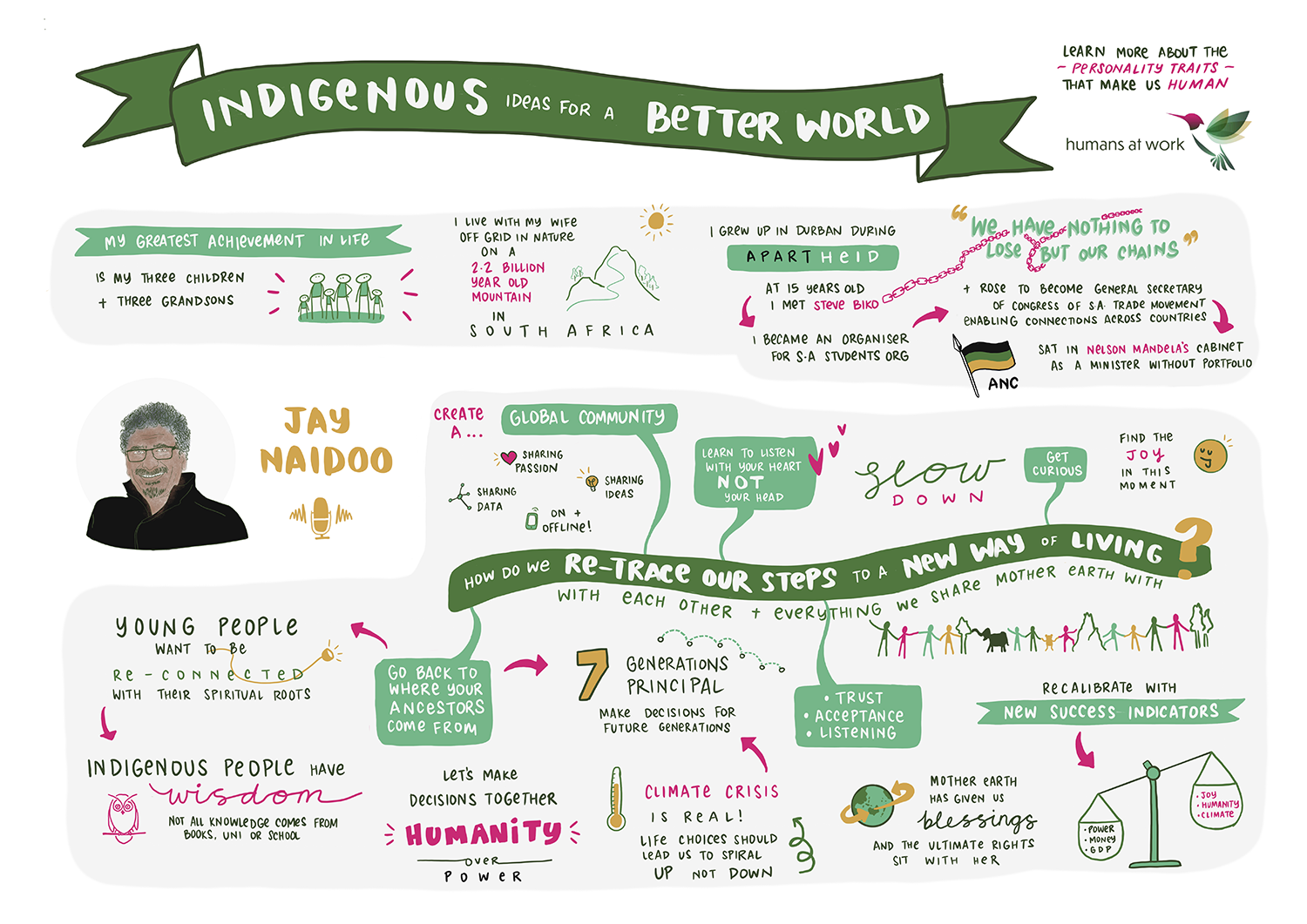Being like the trees – ethical and sustainable leadership in times of system breakdown
Feb 13, 2023
Adults often ask young children ‘what do you want to be when you grow up?’
What we really need the answer to though, are two other questions: ‘who do you want to be?’ and ‘will the earth be liveable for you and your children?’
That might sound like hyperbole, but it isn’t. Its undeniable that the life we have become so accustomed to, that we take completely for granted, is in danger. It is in fact being chipped away so quickly and fundamentally that we can’t take really take it in.
So how do we take the acceptance step and move onto action, how do we move from gut-wrenching, hidden despair to the warm glow of optimism?

In my conversation with Jay Naidoo, we talked about the concept of the 7 Generation Principle. That for every action, inaction, decision we consider what it will mean for the generations to come – in our own families and those of other humans. We also learn from 7 generations past – both what to do and what not to do. Jay also talks about finding joy and the lesson in every situation, no matter how stormy.
Think about that.
If you’re in an executive or board meeting, if you’re deciding which supplier to use in a procurement process, if you’re looking at recruiting into your team and doing some workforce planning.
How do you break the ‘it’s right for us now’ habit, and instead weigh the balance with the ‘it’s right for them in the future’?
One way to think about it is to spend some time understanding the systems upon which this decision, your business model, your current way of thinking is based. If one or more of those systems was absent, broken, turned upside down, would you still make the same decision? What opportunities are there to be creative, innovative and joyful?
Beyond the systems:
By systems here think big:
- Government and legal systems – they appear to be static but they’re not. Look at what happens when a change in the leading party leads to laws being made, broken down, re-imagined. Roe vs Wade?
- Supply chains – the Covid-19 pandemic should have taught us something about the reliance we put on global supply chains and the ignominy of countries which have demolished and denigrated their own food and craft industries and undernourished their inventiveness, for cheaper imports and copying others.
- Urban and transport planning – climate ‘events’ and the shift in how and where people want to live and work have already undone the ‘future’ thinking of a few years ago (perhaps even the future plans being designed today). One flooded city from a weekend of rain is all it takes to undermine the foundations, literally and figuratively.
- Power – ever shifting, coalescing publicly in the few, yet evidently also a superpower when used in collaborations of multitudes of individuals. The shift to more people working independently, where and when they want, armed with their own unique skills and experience and the tools of their trade, trading directly with customers. That is a power shift of significant proportions.
If the current systems are broken or at breaking point, the opportunity is now to reimagine you and your organisation’s role in creating better, fairer, regenerative systems.
Systems are also present within organisations. There are the written, formal, obvious systems – hierarchies, delegations, IT/HR/Finance tech – and then there are the cultural systems – ‘the way we do things’. Lift up the lid in any organisation, and you’ll normally find that both the formal and informal systems have some positives and some negatives. And increasingly, the negatives will be the defining point of difference between being successful, achieving goals, being a good place to work – and being that place everyone complains about.
Ethical and sustainable leadership:
If you’re a leader – in an organisation, an industry, a community – your greatest challenge now is how to focus your efforts on ethical leadership and sustainable practice.
Humans at work defines ethical and sustainable leadership as:
Influencing, guiding, and directing people to make good decisions (for now and the future), and to take actions based on the values of courage, mutual respect, accountability, equity, trust, honesty and dignity.
It means:
- establishing work and business practices that are legal, respect human rights and are fair, minimising worker exploitation and harmful environmental practices throughout the supply chain,
- creating the conditions that meet current needs while regenerating the workforce, systems, investments and partnerships to meet future demands,
- ensuring the continuity of the organisation and community it sits within, by safeguarding the balance between people, planet, profit and impact.
In this way, we all have the accountability and mandate to create the conditions for the future of the organisation and community we work within. And to hold ourselves and others accountable for becoming a better version of who we are now, integrating our internal and external focus.
With the ethical and sustainable leadership frame in mind, put yourself in the same position 20, 30, 40 years from now, would you make the same decisions now?
It’s often hard to think that far into the future, and the actions you can take today can seem too insignificant in terms of impact. Our lack of ability to create dramatic effects can cause us to feel paralysed today. But individual and organisational shifts change the dynamic, they show the way, they show others that things can be different.
How you lead, the decisions you make today, can have an impact – and cumulatively and collectively they can amount to significance.
So the time to start is right now. Today. Don’t wait. The role of leaders is to lead, to break new ground and disrupt. If you want some support with that, check out our humans at work packages.
Legacies:
Ecologists have found a young tree grows better when it's planted in an area with older trees. The reason, it seems, is that the roots of the young tree are able to follow the pathways created by former trees and implant themselves more deeply. Over time, the roots of many trees may actually graft themselves to one another, creating an intricate, interdependent foundation hidden under the ground. It's through this powerful dynamic between younger and older trees that an entire ecosystem is transformed. Trees communicate with one another, stronger trees share resources with weaker ones, so that the whole forest becomes healthier. https://legacyproject.org/7gen/index.html
When you’re an ‘elder’, as Jay calls himself, will you be able to hold your head up and say you tried your best? You thought of others, you thought of the future?
With regenerative systems gathering pace, and every individual taking the opportunities they have to exercise their own power in decision-making with future generations in mind, we can legitimately ask our younger generations – who do you want to be?
Do you want to be kind, visionary, to carry the legacy we have re-carved so that your children’s children have the opportunity to grow up in a liveable, fun, exciting and healthy environment?
I’ll leave it to Jay to have the last word:
We are at a point, Jules, where we have to make some tough decisions and it’s not based on money and power; it’s based on understanding our humanity, our custodianship, our relationship with every other species over which we have no dominion and no rights, in fact.
Mother Earth itself is the one that has given us these blessings and the ultimate rights sit with her.
If we were to recalibrate our relationship in order to survive, then we have to change how we exercise the blessings that we have been given.

Being like the trees – ethical and sustainable leadership in times of system breakdown, with Jay Naidoo — podcast
The illustration below depicts the journey of the podcast episode with Jay, have a read.
Hear my whole conversation with Jay Naidoo

Thank you for reading our blog post! We hope you found it informative and engaging. If you enjoyed our content, we have more to offer through our podcast and monthly newsletter. Here's how you can stay connected and get even more value from Humans at Work.
Book Jules as a speaker: you can book Jules to speak at your event, be a panelist or to come and talk to your organisation - either online or in person. Book a free initial conversation via Calendly.
Support us: consider supporting us on Ko-fi here if you liked this content. This will help us continue celebrating diverse humans and our collective ability to improve social equity and environmental regeneration through individual, organisational and system-level change!
Check out our Podcast here: Listen to other human stories and hear how their unique personalities and experiences have shaped them. These fireside chats illustrate how joyous it is to engage with another person, to be curious, and to recognise the value they bring just by being there.
Sign up to the Human Hub: Stay up-to-date with the latest Humans at Work newsletter. By joining the human hub, you'll receive regular updates delivered straight to your inbox. We value your privacy and promise not to spam you! To sign up, fill out the subscription form on our website.
Connect on LinkedIn: Follow Jules via Jules' LinkedIn. And don't forget to join the conversation by following Humans at Work on Linkedin, to get real-time updates and engage with other like-minded individuals.
Jules and the Humans at Work team greatly appreciate your support, and look forward to connecting with you!


